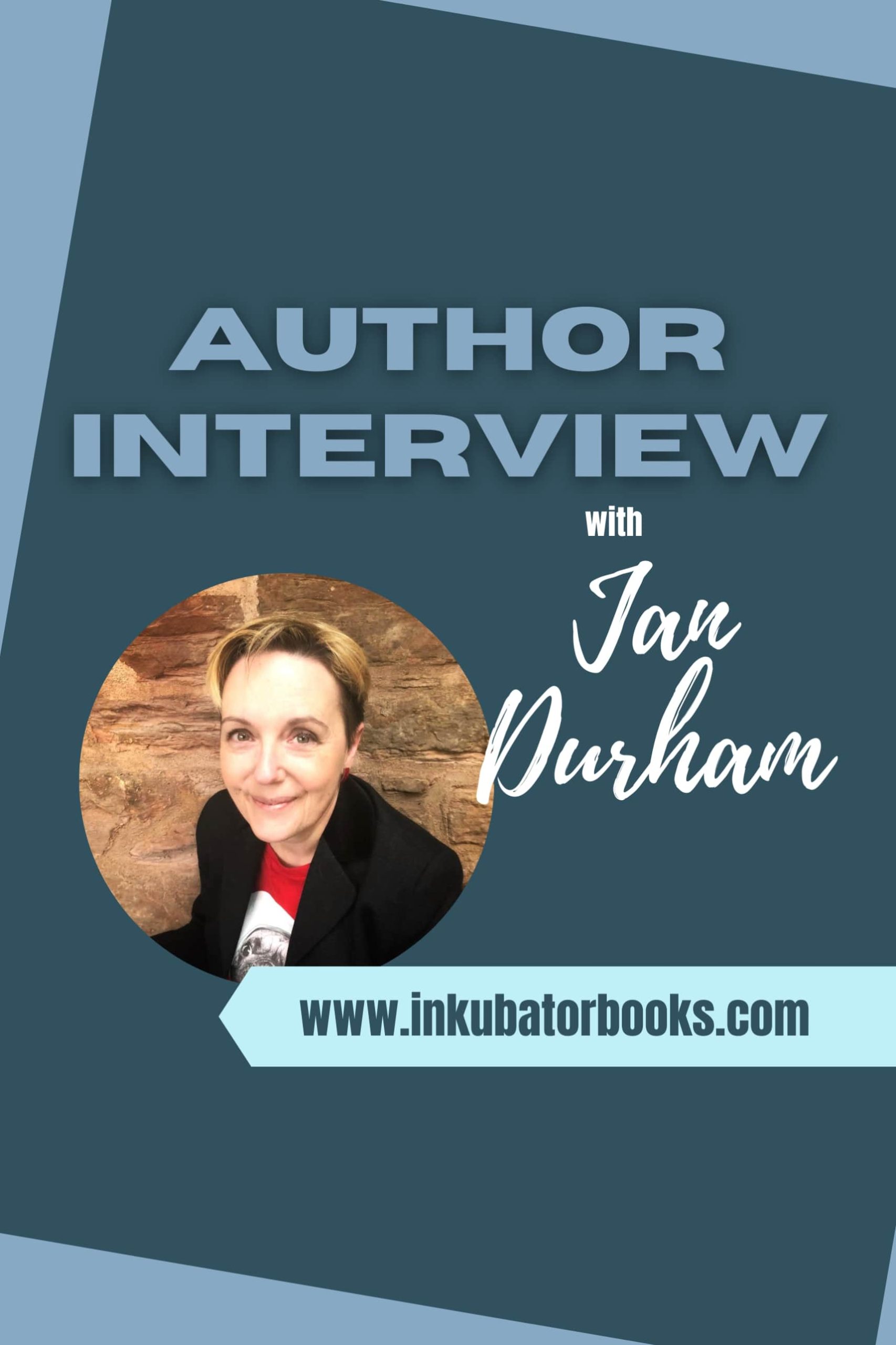Today, we’re speaking with Inkubator Books’ author Jan Durham. Jan is the author of the cozy crime series Kipper Cottage Mysteries. She is just about to launch the third book in the series, Death at the Feast.
Inkubator Books: When did you start writing?
Jan Durham: I think I’ve always written, from being very small. My first ever reader-pleaser was a story I wrote in primary school, about three goblins, that was read out to the class. I’ll never forget the feeling I had when I realised everyone liked it. I did English at university, then became an advertising copywriter (so… yes… still writing fantasy!). I had a couple of erotic fiction novels published in my thirties, and always wrote in my spare time, but didn’t become a full-time writer until I was 49. Proof that you CAN teach an old dog new tricks!
IB: What does a typical day of writing look like for you?
JD: I’m a ridiculously early riser, partly thanks to having had three kids, and partly because of our two dogs, who expect breakfast and a walk as soon as the sun nears the horizon. I usually write through to one-ish, then I’ll walk the dogs again. Unless I have a deadline or I’m feeling particularly ‘in the zone’ I’ll probably leave it there.
IB: Do you base your characters off people you know or are they all the product of your imagination?
JD: A little bit of both, I suppose. I would never take someone I know well and transplant them whole into a novel, that wouldn’t be fair, or make particularly compelling fiction. But I definitely take bits of people – mannerisms, eccentricities – and expand on them or combine them together to make a fictional creation. One of my favourite inspirations for character is eavesdropping on buses and trains. Just the merest snippet of conversation, taken out of context, can lead to fabulous flights of fancy and some very original fictional creations.
IB: What’s the most difficult part of your writing process?
JD: When I first started writing novels I hated the outlining process, but now that I’ve grown more used to it I can see how very useful it is. And, of course, it can save a LOT of time. I love writing the beginning of a story, and the end, but sometimes run out of steam in the middle. I suppose that’s why outlining and structure is so important. You just have to keep going and trust the preparation work you’ve already done. Stick to the map and you’ll get there.
IB: What comes first for you – plot or characters?
JD: Characters, always. Of course, that’s usually true in a series, where you already have a cast of characters to play with. Then you just have to give them something to do.
IB: Which of your books is your favorite? Why?
JD: I suppose my first book in the Kipper Cottage series – Death at the Abbey – is probably my favourite. Not because it’s any better than the others, but because it was my first foray into the world of Liz McLuckie and her friends. I think I knew from the very first page that this was a world I wanted to spend a lot of time in. It was a bit like falling in love, really.
IB: How would you describe your ideal reader?
JD: Anyone who enjoys one of my Kipper Cottage novels! Seriously, writing for an appreciative audience is such a privilege. As an author you spend so many years writing to learn your craft, with nary a reader in sight. I still haven’t quite grown used to the idea that so many lovely people enjoy reading my books
IB: What are you doing when you aren’t writing?
JD: I make dollhouse miniatures. Teeny tiny luggage – suitcases, trunks, bags – and sell them online. I think it’s really important for anyone who lives mostly in their own head to have a physical hobby. Something you can really lose yourself in, that’s completely different from what you usually do. The miniatures are just a hobby, though. It’s just luck that I can make money from them too.
(Ed Note: If you’d like to see Jan’s miniature creations, you can find them on Etsy.)
IB: What does your writing space look like?
JD: I work almost entirely from a comfy chair in the kitchen, with my notes close to hand. I don’t have a study or even a desk of my own. I know that goes against all writing advice, but I like the bustle of the kitchen – if I had a perfectly quiet, perfectly organised place to write I suspect I would get very little written. I have had to cultivate the sensibilities of a police horse, though. When I’m deep into a chapter, fireworks could go off in the kitchen and I don’t think I’d notice.
IB: Have you ever traveled to research for a book?
JD: Given that my series is set in Whitby, I like to go there whenever I get the chance. It’s a two-and-a-half-hour drive from my house in Edinburgh, or a few hours by train (there’s no direct route). Last October I went for the famous Whitby Goth weekend, which was fantastic fun. Between visits I do spend a lot of my time on Google maps, checking details, but it’s really not the same. There’s no substitute for actually being there, wandering around the streets and soaking up the atmosphere.
IB: What genres do you like to read? Who are some of your favorite authors?
JD: I’ve always enjoyed crime and psychological thrillers, but tend to steer away from the really bloody ones. I have a soft spot for historical crime – CJ Sansom is a particular favourite. I love his main character – Matthew Shardlake – he has so much subtlety and vim. I suppose you can only really get that kind of depth with a character you’ve spent years writing about.
IB: How do you come up with names for your characters?
JD: Sometimes names just pop into my head and I know they’re perfect. Other times I might look through baby name books. Occasionally I browse the spines on my bookshelves for author names. However a name might come to me, I know when I have the right one.
IB: What was your favorite childhood book?
JD: Moonfleet by J Meade Falkner. A smuggling action adventure with a bit of supernatural mystery thrown in. I also really enjoyed the Greek myths. I used to check out the same compilation from the school library every week.
IB: Have you ever abandoned a book you were writing? How did you know it was the right thing to do?
JD: Many of my early attempts got no further than a few chapters. I also have a 130,000 word fantasy novel set in the Italian Renaissance sitting in my bottom drawer that I have no idea what to do with. It needs a serious edit, and even then, I doubt it will be fit to publish. It’s just not coherent enough. Some things you just have to chalk up to experience, even if you’ve spent years researching and writing them.
IB: Do you have any tips for first-time authors?
JD: Keep writing and learn your craft. Put the hours in and it will happen.
IB: Who inspires you?
JD: My family (obviously!). I couldn’t spend so much time writing without their support and encouragement.
IB: If you could eliminate one thing from your daily life, what would it be?
JD: Cleaning shower stalls. Seriously, I hate it. I’d much rather scrub toilets. I don’t understand why showers are so hard to clean! Surely someone, somewhere, could have invented something more efficient and less tedious to keep hygienic?
IB: Do you have any pets?
JD: I have two dogs – an elderly one-eyed whippet and a fat black pug. The Laurel and Hardy of the canine world. The whippet is fifteen, and probably on her last legs, bless her. I’m not sure how the rest of us will manage when she’s gone.
IB: How do you approach your genre in a unique way?
JD: I’m not sure that I do, really. The Kipper Cottage books are pretty typical cozy mysteries, in terms of how the story is set up and how the mystery unfolds. I suppose it’s the characters and setting that make them unique.
IB: How do you manage the “whodunit” aspects of your story as far as clues and revelations? Do you outline?
JD: I outline pretty rigorously with my editor at Inkubator. He’s a highly trained BS detector. Anything too thin, anything implausible, anything co-incidental – out it comes!
IB: How do you relax?
JD: I love tv, especially the big American series like Game of Thrones, Fargo and Succession. I love to binge watch them with my kids. I find the discussions we have about the characters and plots afterwards just as enjoyable as the shows themselves.
IB: Who are your first readers when you write a new book?
JD: Just my editor. I used to show them to friends and family, but don’t now. It puts them too much on the spot.
IB: Which do you enjoy writing more: dialogue or internal thoughts?
JD: Dialogue, definitely. I suppose that’s because I also write screenplays. I’ve always been fascinated by the way people talk– what they say, and, even more importantly, what they don’t say. I love subtext!
Thanks to Jan for sitting down with us today.
Want to read Jan’s books? Check out her titles on Amazon.
You can find her at the following places:
Website: https://www.kippercottagemysteries.co.uk/
Instagram: https://www.instagram.com/kippercottagemysteries/

